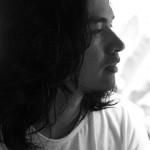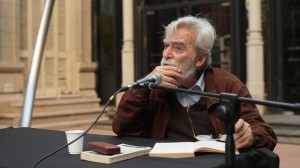A poem by Ronny Someck translated by Robert Manaster and Hana Inbar. Forthcoming soon in The Milk Underground.
פקקים
by Ronny Someckעַל תָּוִית גּוּפָה שֶׁל נ‘ רְשׁוּמָה שְׁנַת הַיִּצּוּר:
17 שָׁנִים הִיא שְׁפוּכָה בָּעוֹלָם
וּפִתְאוֹם אִמָּא שֶׁלָּהּ מְסָרֶבֶת לִסְלֹחַ.
“נִפְתַּח לָהּ הַחֹר“, הִיא אוֹמֶרֶת, “נִסְגַּר לָהּ הַמֹּחַ“.
עֵינֵי הַזְּכוּכִית שֶׁל נ‘ מַבְרִיקוֹת מִדְּמָעוֹת,
בַּלֵּילוֹת הִיא מַצְלִיבָה עַל כִּסְּאוֹת בָּרִים
רַגְלַיִם שְׁבוּרוֹת מֵרִקּוּד, רוֹאָה
אֵיךְ הַפְּקָק הַצָּרְפָתִי מִתְעוֹפֵף מִפִּי הַשַּׁמְפַּנְיָה,
אֵיךְ הַמֶּקְסִיקָנִי חָבוּשׁ כְּסוֹמְבְּרֶרוֹ עַל רֹאשׁ הַטָּקִילָה
וְהַגֶּרְמָנִי מְחֻדַּד הַשִּׁנַּיִם נוֹגֵס אֶת צַוַּאר הַבִּירָה.
אִמָּא, בּוֹאִי תִּרְאִי, הִיא רוֹצָה לִצְעֹק וּמְדַמְיֶנֶת מִיָּד
אֶת הַתְּשׁוּבָה: “זֶה לֹא סְתָם פְּקָק, הַבְּתוּלִים הָאֵלֶּה,
זֶה הַנְּדוּנְיָה שֶׁלָּךְ“.
נ‘ חוֹזֶרֶת הַבַּיְתָה וּמַנִּיחָה אֶת נַעֲלֵי הָרִקּוּד
לְיַד הַמִּטָּה כְּמוֹ שְׁתֵּי נְשִׁיקוֹת עַל לְחִי הָרִצְפָּה.
Corks
by Ronny SomeckOn the label of N.’s body, the vintage year is written:
17 years she’s been poured out to the world
And suddenly her mother refuses to forgive.
“Her hole got opened,” she says, “her mind got closed.”
N.’s glassy eyes are shining with tears.
At nights, she crosses her dance-weary legs
While she sits on bar stools, watching
How the French cork flies from the champagne mouth,
How the Mexican is worn like a sombrero over the tequila’s head
And the German with the sharpened teeth is biting the beer’s neck.
“Mom, come see,” she wants to cry and imagines instantly
The answer: “This is not just a cork, this virginity.
This is your dowry.”
N. returns home and sets her dance shoes down
Near the bed like two kisses upon the floor’s cheek.
translated from Hebrew by Robert Manaster & Hana Inbar






 Two poems by Juan Carlos Mestre translated by Patrick Marion Bradley.
Two poems by Juan Carlos Mestre translated by Patrick Marion Bradley. 